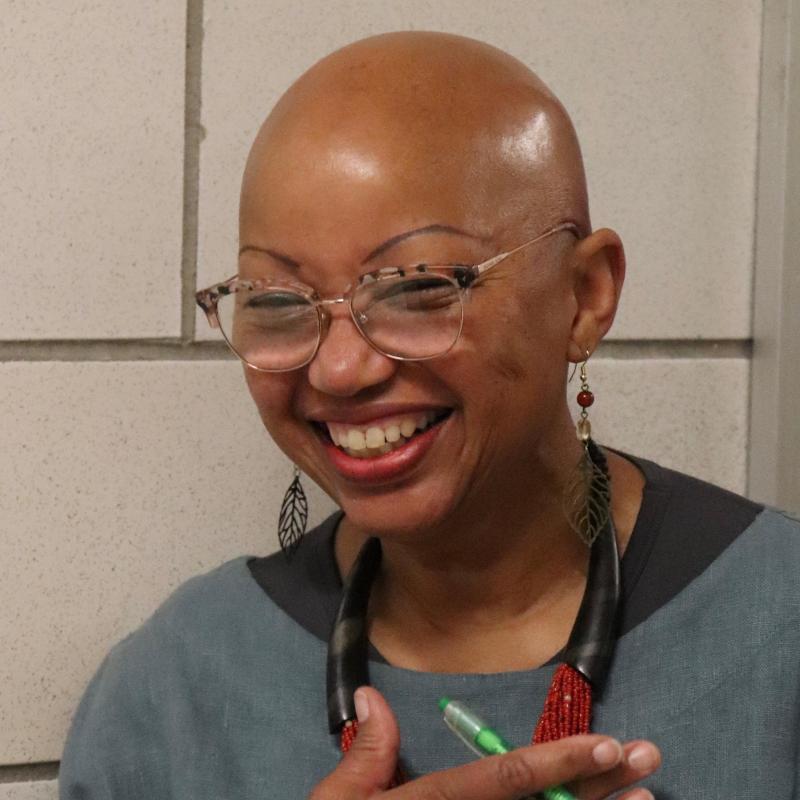“I am struck by the privilege I’ve had being a safe person to talk to about this moment of conflict, anger and politicization for women in this pandemic,” says Lauran Waters-Cherry, AFSA’s secretary-treasurer, about her advisory work with educators in the Oakland Unified School District.
Waters-Cherry served 23 years in Oakland Unified as a teacher, assistant principal, principal and administrator before retiring in 2018 to look after her aging parents. She has continued to consult for the district on issues of personal and professional growth, in some of the same ways she does for AFSA. In the age of COVID-19, this has been particularly demanding, and yet rewarding.
“So many of these women have children, nieces, godchildren of their own, of all ages, and have been handling their professional positions at the same time,” she says. “They can never curse, cry or be emotional elsewhere, so I value sometimes being able to fill that space for them. It is a sacred space.”
For Waters-Cherry, who is grounded in faith, this has been “a year of illumination” in a long career of great challenges and accomplishments. She believes the COVID-19 pandemic has illuminated for the world the inequities women have dealt with since they were born. She believes it also has illuminated a great deal in terms of racial and economic inequities.
As a Milken Educator Award recipient and a Behring Scholar, Waters-Cherry has been widely recognized as a distinguished educator. Last year, she was inducted into the National Education Hall of Honor. She holds a master of education/administrative credential from the University of California, Berkeley, and a master of public education from The American University in Washington, D.C. She is an alumna of Hampton University.
Waters-Cherry also has been an educator advocate. Until 2019, she was president of the United Administrators of Oakland Schools. Over the years, she served in many capacities that call upon an advocate’s spirit—most recently, for eight years, as program manager for attendance and discipline support service for the Oakland Unified School District.
“I found such satisfaction in that job because I could really have an impact on lives and make a difference,” she says.
The position deal in part with student suspensions and expulsions, which disproportionately impacted students of color. Barring rape and other extreme violence, she thought it was essential to find another way to discipline students and safeguard their future.
“It was a privilege to be able to talk colleagues out of the most extreme measures, that being expulsion,” she recalls, “and to support opportunities that promote multitiered systems of supports to students, providing a safe space for all. There was nothing better than being at these crossroad conversations and intervention moments.”
Of all her professional memories, she particularly savors her year as the principal of Prescott Elementary School in West Oakland, which she took over and led during its year in state receivership. Without her superb team, she doesn’t believe she could have turned the school around. “It was the year of my knee replacement,” she laughs.
But with her superb team, and with parent involvement, she set her sights on “making sure the kids and the staff had the best year they could.” By the end, they emerged with strong academic scores. The school was renamed the Preparatory Literary Academy of Cultural Excellence.
“I will be proud of that work until the day I die,” she says, “but I would never want to do it again.”
Nor would she ever want to live through the past year again; yet, she has learned from it and believes countless other people have as well. There is no question in her mind, however, that the burden upon women has been particularly demanding. Not all women are as fortunate as she to have a large supportive family. Waters-Cherry lives in an intergenerational household, with people ranging in age from 11 to 89. When she and other relatives came down with asymptomatic COVID-19, they were able to go on with their lives and also rally around her husband, Lee, who was hit hard and had to be hospitalized for five days.
“Some of our sisters have been more alone and have lost themselves in these times,” she says. “How strong, courageous and yet vulnerable could they be? Many of them had clawed their way through the pipeline to attain their positions and win a seat at the table.”
Now, as the pandemic hopefully winds down, many of these women have to figure out how to stay at the table, or if that is even an option. Waters-Cherry’s own options are wider nowadays, and she can afford to make different emotional and personal investments. She also can lend a hand, or an ear, to those who are at a different, more challenging stage. This seems to be her mission of the moment.

